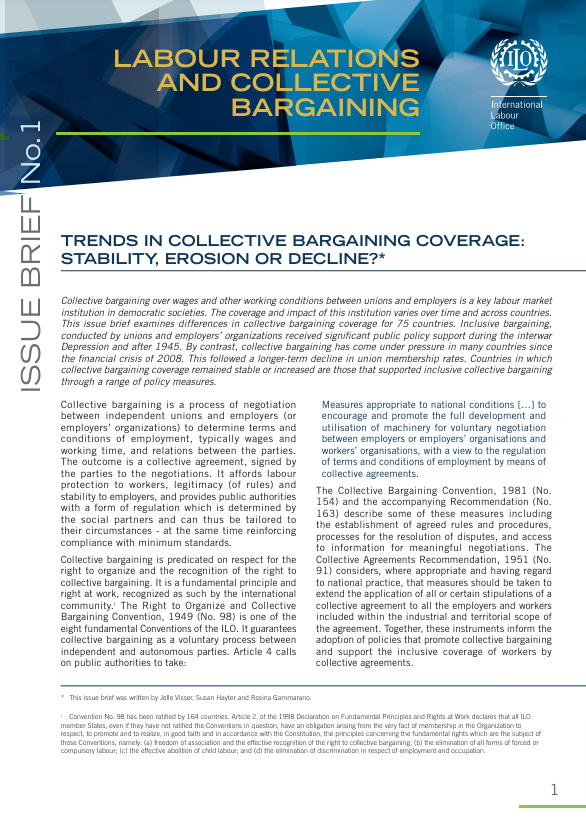
Statistics on social dialogue
This topic page on trade social dialogue provides access to statistical information including data, methods, and publications.
Statistics on social dialogue Read More »

This topic page on trade social dialogue provides access to statistical information including data, methods, and publications.
Statistics on social dialogue Read More »

Collective bargaining plays a key role in promoting decent work and improving working conditions. But what does the ILO’s industrial relations data show regarding the relationship between collective bargaining coverage, trade union density, and outcomes for workers? How can we assess the impact on workers’ lives?

This page describes the methodology for SDG indicator 8.8.2, which measures the level of national compliance with freedom of association and the effective recognition of the right to collective bargaining for all ILO member states.
About SDG indicator 8.8.2 Read More »

This first edition of this new ILO flagship report focuses on collective bargaining.

This guidebook is intended to support ILO’s tripartite constituents in the collection of data on industrial relations, including on trade union membership, on the coverage of collective bargaining agreements and on strikes and lockouts.
Guidebook on how and why to collect and use data on industrial relations Read More »

Concise description of concepts and definitions, uses, sources and limitations for indicators in the database Industrial Relations Data (IRdata), including collective bargaining and union membership.
Industrial Relations Data (IRdata) Read More »

Collective bargaining statistics are crucial to assess labour markets but also the state of industrial relations. However, the particularities linked with the data sources and data quality make collective bargaining statistics a very challenging field of labour statistics. Get information about all the main aspects of collective bargaining statistics in this quick guide.
Quick guide on sources and uses of collective bargaining statistics Read More »

This issue brief examines differences in collective bargaining coverage for 75 countries. Collective bargaining over wages and other labour conditions between unions and employers is a key labour market institution in democratic societies. The coverage and impact of this institution varies over time and across countries.
Trends in collective bargaining coverage: Stability, erosion or decline? Read More »

Freedom of association and the right to collective bargaining are at the core of decent work. They are fundamental rights at work and the foundations of sound industrial relations and effective social dialogue. Data and indicators on trade union membership and coverage of collective agreements, together with other qualitative indicators, are important for monitoring the progress made towards the effective realization of these rights at work.

Adopted by the 3rd ICLS (1926), this resolution defines statistics on collective agreements.
Resolution concerning statistics of collective agreements Read More »